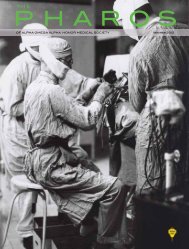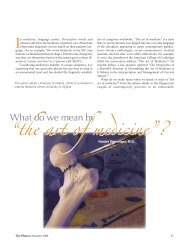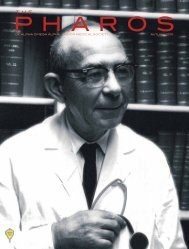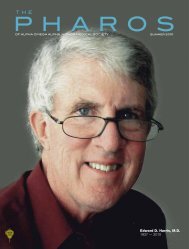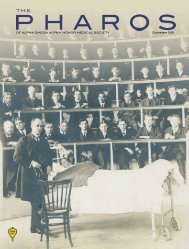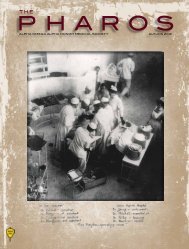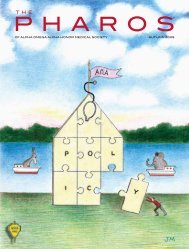Download The Pharos Winter 2008 Edition - Alpha Omega Alpha
Download The Pharos Winter 2008 Edition - Alpha Omega Alpha
Download The Pharos Winter 2008 Edition - Alpha Omega Alpha
Create successful ePaper yourself
Turn your PDF publications into a flip-book with our unique Google optimized e-Paper software.
students, and medical school staff faculty.<br />
When I see fear, anger, and sadness<br />
on the faces of my classmates and teachers,<br />
I remember my own feelings after<br />
my family members attempted suicide.<br />
Since then, I have thought a great deal<br />
about suicide and depression. I wish I<br />
had insights to share at Mike’s memorial<br />
that could help my classmates, but I had,<br />
and still have, no explanation. Suicide<br />
is a terrible tragedy. I know the world<br />
would be a better place if Mike was still<br />
with us. I do not want to simply mourn<br />
Mike and move on. I can only share<br />
what I do to make peace with my painful<br />
memories. In a deep and personal<br />
way I know the serious, insidious, and<br />
lethal nature of depression. I will never<br />
underestimate depression.<br />
Two days after Mike’s death I was<br />
shadowing a physician in the emergency<br />
department. A patient presented<br />
with medically unexplainable abdominal<br />
pain. She attempted to obtain pain<br />
and anxiety medications that would<br />
essentially keep her in a stupor for<br />
weeks. <strong>The</strong> physician said that she was<br />
depressed and he could not help her.<br />
He did not call for a psychiatric consult,<br />
nor did he share his diagnosis<br />
with her. Although she was already<br />
on two antidepressants, the physician<br />
did not discuss the effectiveness of<br />
these medications with her or adjust<br />
dosages. My painful memories of family<br />
members’ depression gave me the<br />
courage to speak up to advocate for<br />
the patient and suggest more attention<br />
be given to her depression. In<br />
Mike’s memory, I promise to continue<br />
to speak up through my entire medical<br />
career to encourage people who are<br />
suffering from mental illness to accept<br />
help. I promise to continue to encourage<br />
fellow health care providers to address<br />
mental as well as physical illness<br />
when treating patients.<br />
In addition, on a one-to-one basis I<br />
can support my colleagues. Right now<br />
that is easy. My medical school classmates<br />
and I are very close. We have both<br />
celebrated and mourned together. I am<br />
comforted knowing that my classmates<br />
will look out for me and I will do the<br />
same for them. I am comforted knowing<br />
that although my teachers push me, they<br />
will catch me if I fall. I need to make sure<br />
I continue to reach out to those around<br />
me as I continue in my training. Even<br />
as a busy resident I need to make sure I<br />
continue to check in with my peers. If I<br />
see someone struggling I will make the<br />
effort to take time and listen. I will let<br />
him or her know that there is no shame<br />
in asking for help. In fact, it is the strong,<br />
not the weak, who seek help.<br />
Please catch me if I fall<br />
In 2002 and 2005 the American<br />
Foundation for Suicide Prevention convened<br />
experts in the field to set priorities<br />
for research and interventions<br />
on physician suicides. A 2003 review<br />
article outlined recommendations to<br />
reduce physician suicides. 6 This report<br />
outlined positive actions that people<br />
in all aspects of medicine can take to<br />
reduce physician suicides. <strong>The</strong>se resources<br />
can be consulted for further<br />
information. Physicians and their advocacy<br />
groups should work together to<br />
reform hospital privileges applications<br />
to ensure that those who have sought<br />
mental health help are not penalized,<br />
and to prevent punitive treatment of<br />
physicians who may seek it in the future.<br />
Medical schools that do not have a<br />
comprehensive plan for medical student<br />
mental health should immediately establish<br />
one. Physicians can educate their<br />
peers when someone makes a disparaging<br />
remark stigmatizing people who<br />
seek psychological treatment.<br />
Together as physicians and future<br />
physicians we must change the ideal of<br />
toughness in medicine. <strong>The</strong> stiff- upperlip<br />
mentality and the perceived weakness<br />
of mental distress are harmful to<br />
our patients and to our profession. We<br />
must stop stigmatizing those among<br />
us who seek mental health care and<br />
actively remove the barriers to seeking<br />
mental health care.<br />
References<br />
1. National Center for Health Statistics.<br />
Health, United States, 2004: With Chartbook<br />
on Trends in the Health of Americans.<br />
Hyattsville (MD): U.S. Government Printing<br />
Office; 2004: 58–62.<br />
2. Givens JL, Tija J. Depressed medical<br />
students’ use of mental health services<br />
and barriers to use. Acad Med 2002; 77:<br />
918–21.<br />
3. Guthrie EA, Black D, Shaw CM, et<br />
al. Embarking upon a medical career: Psychological<br />
morbidity in first year medical<br />
students. Med Educ 1995; 29: 337–41.<br />
4. Hays LR, Cheever T, Patel P. Medical<br />
student suicide, 1989–1994. Am J Psychiatry<br />
1996; 153: 553–55.<br />
5. Tjia J, Givens JL, Shea JA. Factors<br />
associated with undertreatment of medical<br />
student depression. J Am Coll Health 2005;<br />
53: 219–24.<br />
6. Center C, Davis M, Detre T, et al.<br />
Confronting depression and suicide in physicians:<br />
A consensus statement. JAMA 2003;<br />
289: 3161–66.<br />
7. Miles SH. A challenge to licensing<br />
boards: <strong>The</strong> stigma of mental illness. JAMA<br />
1998; 280: 865.<br />
8. Tyssen R, Vaglum P, Gronvold NT,<br />
Ekeberg Ø. <strong>The</strong> impact of job stress and<br />
working conditions on mental health problems<br />
among junior house officers: A nationwide<br />
Norwegian prospective cohort study.<br />
Med Educ 2000; 34: 374–84.<br />
9. Zoccolillo M, Murphy GE, Wetzel<br />
RD. Depression among medical students. J<br />
Affect Disord 1986; 11: 91–96<br />
10. Dyrbye LN, Thomas MR, Shanafelt<br />
TD. Systematic review of depression, anxiety,<br />
and other indicaters of psychological<br />
distress among U.S. and Canadian medical<br />
students. Acad Med 2006; 81: 354–73.<br />
11. Hampton T. Experts address risk<br />
of physician suicide. JAMA 2005; 294:<br />
1189–91.<br />
<strong>The</strong> author’s address is:<br />
Medical Student—Class 2010<br />
College of Medicine—Office of Student<br />
Affairs<br />
231 Albert Sabin Way<br />
Cincinnati, OH<br />
E-mail: finlayhe@email.uc.edu<br />
<strong>The</strong> <strong>Pharos</strong>/<strong>Winter</strong> <strong>2008</strong> 7




